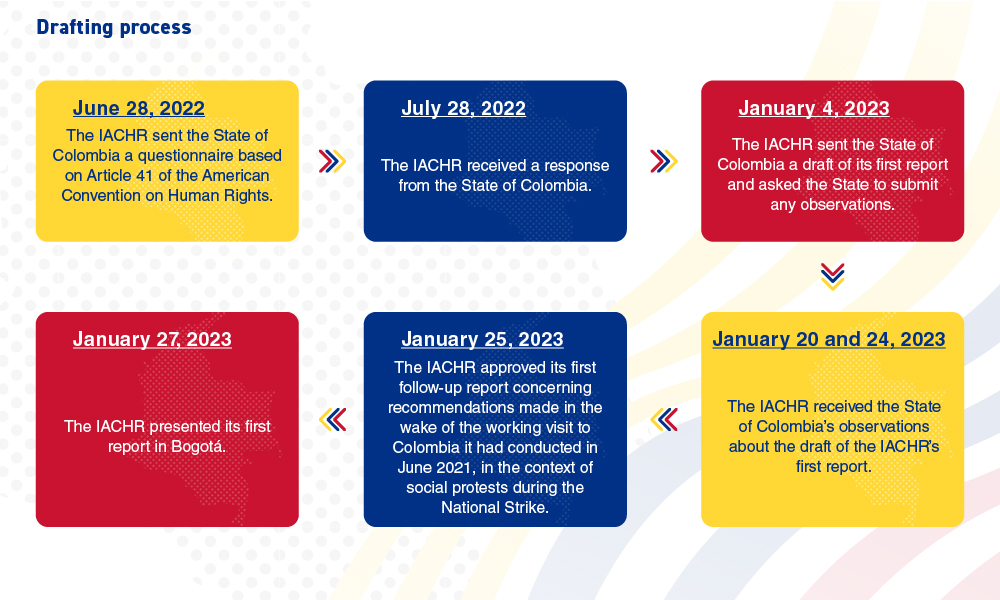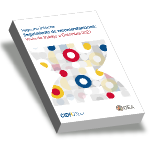- English
- Español

Background
The IACHR conducted a working visit to Colombia over the period June 8–10, 2021. The visit happened in the context of the “National Strike,” as a series of social protests that took place in Colombia from April 28, 2021, became known.
In the report Observations and recommendations: Working visit to Colombia, the IACHR detailed the context, background, and findings of its visit, concerning the exercise of social protest in the country.
In particular, the report mentioned a set of findings concerning serious human rights violations committed during these protests, especially concerning the rights to life, personal integrity, and liberty, with disproportionate impacts on demonstrators.
The IACHR has conducted various activities to identify progress made and challenges encountered in efforts to implement the recommendations made to the State of Colombia. These include the following:
- Follow-up hearings:
- Follow-up on observations and recommendations made in working visit to Colombia, October 26, 2021, 181th Period of Sessions
- Follow-up on recommendations concerning the investigation of human rights violations committed during the National Strike, July 8, 2024, 190th Period of Sessions
- First follow-up report concerning 28 recommendations, presented in Colombia on January 27, 2023: This report included data that had been submitted by the State and by civil society, as well as publicly available information. The report noted that compliance with 11 recommendations remained pending, while partial compliance had been attained concerning a further 14, substantial partial compliance had been attained in 3 more, and no recommendations had attained full compliance.
- Seven rounds of talks held over the period November–December 2023 with representatives of various State institutions: During these talks, participants submitted information about implementation efforts and developed guidelines to monitor compliance with recommendations.
- Seven rounds of virtual group talks were held over the period September 2023–February 2024 with civil society organizations: These talks sought to find out what civil society organizations wanted follow-up to focus on, as well as any progress and challenges they had identified concerning the implementation of recommendations. These talks followed an open call, and participants were asked to get other interested organizations involved.
- Additional platforms for dialogue with victims and civil society organizations, concerning issues including violence resulting in eye injuries, discrimination and violence based on ethnic and racial criteria, regional investigations, and the situation of individuals who had been arrested for reasons linked to the 2021 National Strike
- Consultation with an expert about psychosocial redress for individuals who had suffered eye trauma in the context of social protests
- Talks with OHCHR representatives in Colombia, to access information about progress made to implement IACHR recommendations
- Requests for information sent in 2024 to the State and to civil society, with a view to drafting the second follow-up report concerning 33 recommendations that had been considered priorities by the Joint Monitoring Mechanism
- Compilation of publicly available data to supplement monitoring efforts: The IACHR monitors media reports and public reports issued by the State and by civil society organizations and international organizations.
Crucially, comprehensive compliance with IACHR recommendations ensures the full protection of human rights and contributes to the development of the inter-American human rights system. The IACHR applies strategies to monitor recommendations, in order to identify efforts to attain compliance and to promote the timely adoption by the State of measures aimed at effective implementation.
On January 25, 2023, the IACHR approved its first follow-up report concerning recommendations made in the wake of the working visit to Colombia it had conducted in June 2021, to observe the situation of human rights in the context of social protests during the National Strike. This follow-up report was presented in Bogotá on January 27, 2023.
For this first follow-up report, the IACHR chose to focus on 28 of the 41 recommendations made following this working visit, with a view to restricting the analysis to the recommendations expected to have the biggest immediate impact on the exercise of social protests.

To draft its first report, the IACHR also sent questionnaires to civil society organizations and to Colombia’s Ombudsperson’s Office. The IACHR delegation met with representatives of the Office of the United Nations High Commissioner for Human Rights (OHCHR) in Colombia, to supplement its data and to access additional relevant sources.
For this first report, the IACHR selected 28 of the 41 recommendations it had made in the wake of its working visit to Colombia in June 2021. The selection sought to restrict initial analysis to the recommendations expected to have the biggest immediate impact on the exercise of social protests.
- Identifying compliance and progress in processes to implement these 33 recommendations
- Establishing the degree of compliance attained with each recommendation: Compliance with each recommendation was assessed according to the General Guidelines on the Follow-Up of Recommendations and Decisions of the Inter-American Commission on Human Rights, published by the IACHR in 2019.
- Focusing on the challenges to attain compliance with recommendations


